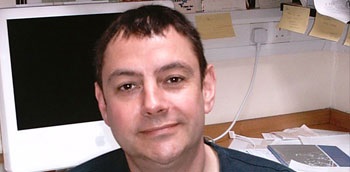Putting the brakes on cancer
Published On Thu 18 Dec 2014 by Grant Hill

A study led by the University of Dundee, in collaboration with the University of Bath, has uncovered an important role played by a tumour suppressor gene, helping scientists to better understand how it combats the effects of mutations which drive cancer development.
The research, published in Proceedings of the National Academy of Sciences (PNAS) USA, shows how an enzyme called Dual-specificity phosphatase 5 (DUSP5) supresses tumour formation by 'switching off' another enzyme called ERK, which is involved in driving cell proliferation and survival.
The abnormal cell growth seen in cancers is often caused by mutations in so-called ‘oncogenes’. One of the most important of these is called ‘Ras’ and once mutated and activated, it can send powerful signals through ERK to drive tumour formation. The new study shows that DUSP5, by ‘switching off’ ERK, can act as a tumour suppressor and put the brakes on cancer development.
The University of Dundee’s Professor Stephen Keyse, head of the Cancer Research UK Stress Response Laboratory at Ninewells Hospital, explained, “We know quite a lot about the way cancer-causing genes get switched on and drive the abnormal growth seen in tumours, but far less about the ways that our cells can react to this and try and suppress the dangerous signals that oncogenes propagate.
“Our work reveals that DUSP5 has an important role in protecting cells against the cancer causing effects of Ras mutations. It does this by switching off ERK in the cell nucleus and preventing the expression of other genes, which act to change cellular behaviour and promote tumour growth”
Dr Jim Caunt, Lecturer in Biology & Biochemistry at the University of Bath, said, “This study shows that DUSP5 has a protective effect in cancer using a model that replicates a number of features akin to human tumour development - when DUSP5 function is lost, exposure to certain cancer-promoting agents results in many more tumours.”
Moving forward, this work will form the basis of future studies of DUSP5 and help determine whether it can also suppress Ras-induced tumours in lung, pancreas and intestine, all common sites of human cancer.
“It will also be vital to study the expression of DUSP5 in human tumours to see if its expression is lost as part of the mechanism by which tumours progress,” added Professor Keyse.
“Overall, the more we know about the ‘wiring’ of cancer cells and can unravel the complex interactions that occur in the way that cancer causing signals are processed, the better placed we will be to try and design new interventions and treatments.”
The paper is available to read here: http://www.pnas.org/content/early/2014/12/05/1420159112
For media enquiries contact:
Grant Hill
Press Officer
University of Dundee
Nethergate, Dundee, DD1 4HN
TEL: 01382 384768
E-MAIL: g.hill@dundee.ac.uk
MOBILE: 07854 953277